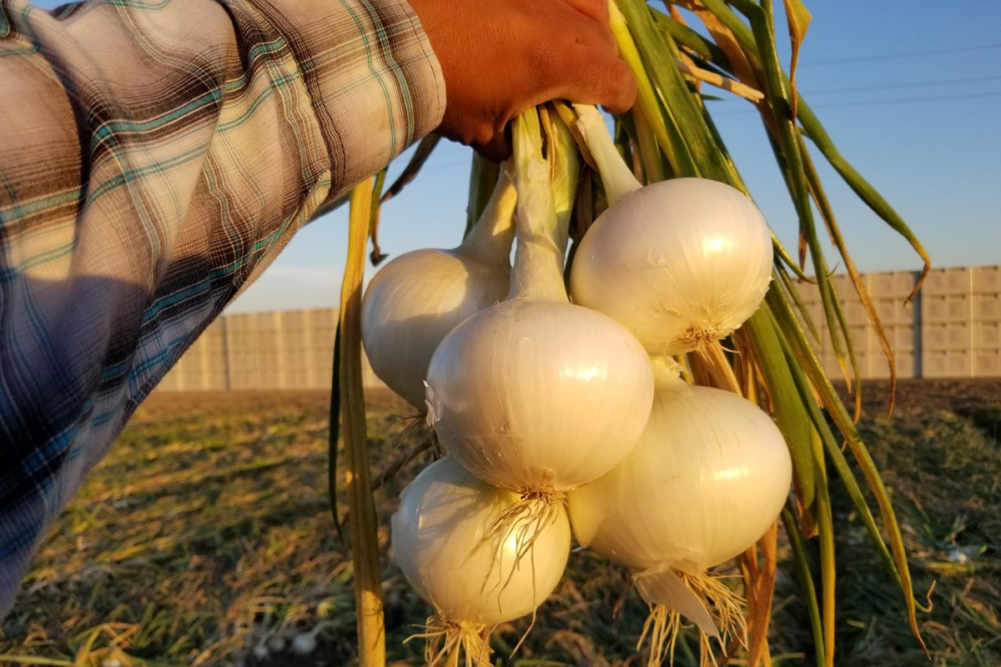On its main farm in Yerington, Nev., Yerington-based Peri & Sons Farms plants the Nevada White and Sweetie Sweet branded onions the company is best known for, in addition to other onion varieties, said Teri Gibson, Peri’s director of marketing and customer relations.
Peri plants long-day varieties of conventional and organic red, white, yellow, and sweet onions around March and then harvest them in late August or September. The company stores, packs and ships all of its onions from its food-safe packing and shipping facilities at the farm, Gibson said.
This year’s crop got off to a rough start, but Peri has adjusted and is looking forward to a strong fall and winter.
“Mother Nature can be counted on to throw curve balls at us farmers and this year was no exception,” Gibson said. “We had to replant 1000-plus acres, at no small cost, due to windy and cold weather this spring, but despite that setback we are looking at yields that are above average and our sizing is spot on.”
Demand for the company’s product is expected to be strong. Peri and other shippers benefit from category-wide popularity.
“Onions continue to be one of the strongholds in the produce department,” Gibson said. “While restaurants are open again, the cost of eating out, due to inflation, is still a deterrent. People are continuing the home-cooking trend and buying fresh produce.”
According to a recent consumer report, home cooking in some shape or form is here to stay, with 85% of those surveyed saying that they will continue to be cooking more at home in 2022, Gibson said.
At the height of the pandemic, Americans ate 88% of their meals at home, up from the 83% pre-pandemic level. Good news for grocery stores.
As popular as they are, onions, like all fresh produce commodities, can reap huge benefits from proper merchandising. And in today’s tight labor market, grocers themselves often don’t have the manpower to make sure that happens. It’s crucial for shippers to lend a hand where possible.
For Peri, highlighting their products’ origin story is key to successful merchandising at point of sale.
“Consumers like to know what’s special about an item and where it’s grown,” Gibson said. “Given that busy produce teams find it difficult to set-up and keep signage current, we’ve developed eye-catching grab-n-go bags, for all our onion varieties, that provide information about how our onions are grown, their healthful benefits and tips and tricks for cooking with onions.”
Providing that information right on the pack takes the burden off of the retailer’s produce team and still gives consumers the information they need to make an educated choice and buy with confidence, Gibson said.
Another central component of the Peri story is its commitment to sustainability. The company has, for instance, instituted changes to its packaging that allow it to save a lot of material and therefore limit how much makes it into landfills.
It’s not always easy, especially in the current global supply chain crisis, but it’s worth it to Peri.
“It’s an important part of our company culture to practice sustainable measures wherever we can,” Gibson said. “Procuring affordable, sustainable packaging for produce has been challenging, but we are dedicated to moving forward on this front.”
Peri recently launched its Earthbag, a biodegradable, compostable, 100% plastic-free package, as well as new earth-friendly packages for its gourmet line of onions that are biodegradable and compostable.
Peri has consistently grown its business year after year despite having what Gibson characterizes as “one of the most common commodities in the world.”
Part of the key to that success, she said, is rethinking that very “commodity” status.
“We don’t see our business, or our products, as commodities, and we work hard to make sure our customers don’t see us that way either,” she said. “We take the time to build relationships with our customers―sharing information about our farm and our many innovative processes and safety measures we have in place to underscore the added value of our products.”
Relationships, Gibson added, make all the difference. Peri’s customers rely on the company to provide the best value for a consistently premium quality product.
“We understand their needs and their challenges and do everything we can to deliver an exceptional product at a fair price via a seamless process―consistently,” she said. “When there’s no differentiation between options, a buying decision typically comes down to only one factor, price. That’s why we give customers more. We provide a wide range of options in our products, our programs, our packaging, and our delivery and we follow through with attentive customer service every step of the way.”
Peri’s farms and packing facilities in Nevada and California annually produce over 500 million pounds of onions. The company was the first recipient of SCS Global Sustainably Grown certification for domestic onions, and it has also earned GFSI/ GLOBALG.A.P. certification.
Peri is the only grower of Sweetie Sweets, which are available between July and December. The company is also a select grower of Sunions tearless sweet onions, which are available from December through March.

